Could you first introduce yourselves to the reader?
Connor: Sure thing, I’m Connor.
Tom: Is that it?
Ben: We already feel like we know Connor intimately.
C: I didn't want to go on a whole monologue! I thought I’d just give my name and keep it mysterious.
B: I’m Ben.
T: And I’m Tom.
Could you describe the show?
C: It’s a fun, sing-along, pub-show/stage concert. It’s set in a British pub-
T: British and Irish.
C: It’s set in a British and Irish pub, and there’s nine guys, and we celebrate being together and have a good singalong, and explore various issues while we do that. The audience get involved and hopefully have a lovely time.
Congratulations on winning Pick of the Fringe at Adelaide! How does it feel?
T: Overwhelming. I mean obviously we got some nice reviews but we weren’t always full so it’s hard to gauge how it’s being received. We knew we were nominated for the music award, so when we didn't win that award we were all a bit disappointed; we weren’t expecting to be chosen as the pick of the entire fringe.
B: It was pretty cool.
C: It was a really lovely surprise.
T: I wish there was a video of our reaction. That was great. Everyone else was very embarrassed and we were screaming!
C: We started dancing.
B: It was like a semi-football atmosphere, it was pretty funny.
How does Adelaide Fringe compare to Edinburgh Fringe?
T: It’s warmer.
B: Just a few degrees!
C: I think what I like about it is you can actually breathe in Adelaide. There's so much more space. And there's the same excitement and that energy in the air but it’s a much more chilled atmosphere, at least from my perception
B: And it’s only in the evenings and weekends, which I like; it’s not like if you sleep in on a Monday morning you’ve already missed three of your mates’ shows. There’s actually a sense of people are actually still going to live their lives whereas Edinburgh just kind of goes mental!
T: Because there's fewer venues - there's Gluttony and the Garden - it felt like in Gluttony there was quite a family feel; we had several parties and wine tours and things where we really got to know the staff in Gluttony, which you don't really get in Edinburgh, so that was nice.
What was the biggest challenge bringing the show here?
B: For me I reckon the sound in the tent, because in Edinburgh we were quite spoilt, we were in the music hall on George Street which is a year-round venue with incredible acoustics, and in Adelaide the venue had these plastic flaps that blew around if it was windy…and that makes me sound like a prima-donna! It was still great, but we’re doing a lot of close harmony stuff, and we’re paying a lot of attention in the rehearsal room to little rests and little details, and it’s sometimes a little annoying when they get lost because things get broken or things have fallen over.
T: We pride ourselves on the a intricate detail in our music so when that potentially goes out the window when you’re in a tent it’s frustrating.
Did you expect the show to be so successful?
T: Absolutely not, no.
B: No, this guy had another job lined up!
T: Yeah, I’d taken a job in March that started in September so I was looking for something to fill a month or two, so I thought this Choir of Man looks alright, I’ll do that for a month and then go back to a better job, but how wrong was I? This is basically the best job ever. I did not expect it to take off as it has.
C: At first it was very much we’re going to do Edinburgh and then maybe we’ll take it to Adelaide, and then suddenly we’ve got a cruise and then we’ve got an American tour and it just seems to have exploded, so that's credit to all the hard work they're doing.
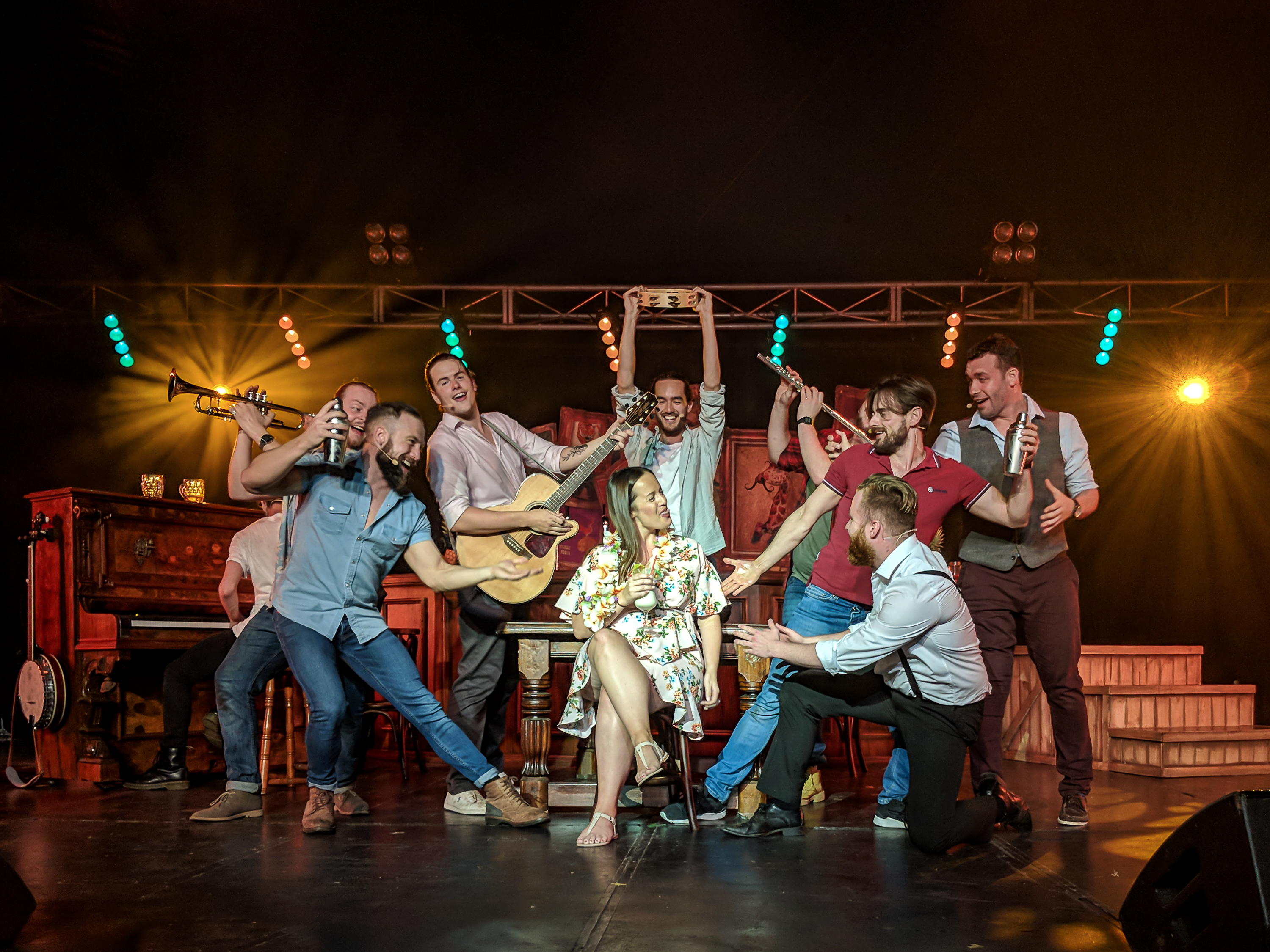 Obviously it’s a feel good show and you want people to enjoy it, but is there anything more serious you want people to take away from it?
Obviously it’s a feel good show and you want people to enjoy it, but is there anything more serious you want people to take away from it?
T: Well in Edinburgh I remember we had a girl who suffered from anxiety badly and she came seven or eight times because the show relieved her of her anxiety. So, something like that - when you have a show that can make people feel better, that’s everything.
C: There’s a lot of audience members we had in Adelaide who did come multiple times and a lot of them did seem to have been through various experiences, some of them traumatic, in their lives, and I think it’s one of the things I enjoy most about the show is that feeling of togetherness and camaraderie. I think that you can see the greater humanitarian feel of just being safe in a group of your friends and that sense of belonging which hopefully translates beyond our specific setting.
T: We get people commenting on the Facebook page saying our son now wants to do performing.
B: It’s a permission-based thing, like all the different types of man you can be; just opening up a world of possibility for people stepping outside the boundaries of gender stereotype. And we hope we can quietly challenge some of those more toxic masculine things about whether you can be there for your mates, and do you always have to have superficial conversations in the pub about women or beer or sport, or can you talk about how you’re feeling and support each other. But we don't want to hit people over the head with it so it is ostensibly an hour of banging tunes and entertainment and that kind of bubbles away underneath. I'm quite proud of that and that's definitely grown since Edinburgh. I've added in a little bit more with the addition of Connor and his wizard fingers on the piano-
C: That’s my nickname actually, ‘wizard fingers’.
B: And he’s also quite a good musician! It’s nice that we can manage to get that in because people may be a bit sceptical about why we need another show with nine dudes who are all straight and white, so we try and use that platform to say something positive about men in general.
T: That's something that's really developed since Edinburgh, thanks to Ben through the addition of new script, and it’s really changed the whole feel of the show.
C: I've had people assuming the show was just a lot of blokes in the pub and that very traditional idea of masculinity, and then they’ve come and seen it and been really surprised and didn't expect it to actually resonate with them.
Why is it important that we change our view on masculinity and that men feel they can talk about things that aren’t sport and beer?
C: It’s very important because if that's the only space in which they feel safe to talk then it leads down a very dangerous path of loneliness, and obviously that can lead to more serious things like self-harm and suicide. And in a more general sense - and not so morbid - it’s just much healthier to be able to discuss these issues and talk about them freely. For some reason men find it harder to do so, and whether that's something inherent or whether it’s something to do with the way society is structured, I think it’s important to recognise that and make it clear that it’s okay to show emotion and be sensitive and ask your friend if they’re okay. Why on earth would that ever be a weakness or seen as something negative? I think that it’s really important that we make that point.
T: And you know, some of us in the show have mental health issues. And when we’re doing the show we forget all of that and we love what we do. I had a cry with Ben the other night and I had a cry with Pete and moments like that have been created by the safety I feel from what I’ve developed with these guys onstage.
C: It brings you closer together. Vulnerability and trust in a mutual way I think are what bring people closer together.
B: We’re a good microcosmic version of this, I think. We’re miles away from home, things are going on over there that we can’t really be involved in, we’ve got things going on here as well, and if I didn't have the guys to talk to about that then I’d be struggling way more than I am. You can get some sound advice or you can just have a cuddle and feel supported, and that's really helped us. We’re a fairly mixed bunch of lads, personalities wise, so I think that hopefully speaks about how it might reach out to men in the audience, and just people in the audience in general.
Do you all have favourite numbers in the show?
T: Stating the obvious but Parting Glass. The more I sing it, the more emotional I get, the more it makes me think of home. Being so far away from home I fear the worst. My mother’s quite ill, so I fear what might happen, and Parting Glass is a song that's quite close to my family. And obviously the arrangement is beautiful as well which helps. It’s a moment when I feel like we’re really together and I feel like we’re holding hands in the song.
B: It’s probably mine as well, you know. For that same reason, although I have no connection to the song - I didn't even know it until someone suggested we should think about it for the show-
T: (whispers) That was me.
B: Until Tom suggested that we put it in the show, and it’s come to mean something for us. If you’ve had a bad day or you’ve had a bad show someone has been there to lift you through that, and it’s just a moment to take stock of that. It makes me think about how much I’ll miss them when this is over and how much closer we’ve all got. Some of us knew each other a little bit beforehand, but now I feel like we are a real group of mates. So yeah, I love that song.
C: It is a great song. But I’ve been racking my brain-
B: Connor hates Parting Glass. He thinks we’re all a bunch of dicks.
C: Exactly! I was just trying to think of my favourite song and I was going through them all and there is genuinely not a song in the show that I don't look forward to performing each night. I get a kick out of all of them in very different ways. I love seeing Freddie do tap each night, I love seeing the urinal come on and those three do their comedy number, I love moments like during Adele’s Hello when we have that stillness. But I guess in a similar way but also in a contrast to Parting Glass, I love the togetherness of Some Nights. It’s very much a moment of togetherness and a moment of just enjoying being in each other’s company, and a chance to just celebrate and have a good time.
How is Fringe different to other types of performing?
B: They’re like all day things. Not that I've had much experience of doing a normal run of a play in a theatre that isn't in a festival, but once the show is up and running your call time is maybe 6pm for a 7:30pm show, so the day is yours, and there's not 1000 over shows happening in the city that day. Nothing gets done for the whole month during Fringe because you’re consumed by the Festival. And even though we talked about Adelaide being quieter, I still found that, maybe because I was a tourist and I wanted to explore. But there's something all-encompassing about festivals that's both amazing and completely exhausting. I sometimes wish we were just doing this in the evening in a city that wasn't bashing you over the head with its culture!
C: Depending on the mood that you’re in it can either be the best thing or the worst thing. But in a touring show you’re with the same group of people in a different city every week, so there's very little continuity or exposure to other individuals, and it can feel very much like a bubble. At the Fringe there are so many people from so many different walks of life, which I love.
What’s next? You’re going on a cruise and then what?
C: Back to Edinburgh again to catalyse again on the huge following we amassed at our launch last year-
T: Have we just officially confirmed that we’re going back to Edinburgh?
B: Get BBC News in!
C: An exclusive reveal for Voicemag!
Who cares about BBC news? Voicemag knows! Are you doing the whole EdFringe run?
T: Yeah we are, and we’ve got a major time slot as well.
B: We were 6:30 last year, and this time we’ll be the slot after, at 8pm. So they’ll be a bit more drunk but not as drunk as they were in Adelaide! We were too late in Adelaide, you see, so it’s that happy medium, that sweet spot. They’ve had a chance for one after work but they’ve not yet ruined their lives.
C: And we’re going to smooth them to that transition!
B: We’re going to ruin their lives in a safe and loving environment.
Finally, what advice would you give to young people who want to get into the arts?
B: Don’t, because then there’s less competition for us!
C: Oh, it’s so difficult. If you don't want to do anything else then go for it, but try and chat to people who are doing the kind of jobs you want to do and just find out what it’s really like. Drama schools sometimes give a very romanticised idea about the industry and people think they’ll go on a three year BA and then be in Les Miserables and everything is going to be wonderful! That’s usually not the case. And add as many strings to your bow as you can, because there’ll be times when you’re going to be out of work, as we all are, so the more skills you have the more things you can do to earn money in between jobs. And even make them part of your jobs, like I’m playing the piano in this show and these two gents play various instruments as well. Arm yourself with skills and then you’re more employable.
B: Particularly as budgets get cut, people would never want to employ a violinist and an actor if they can employ one person to do both.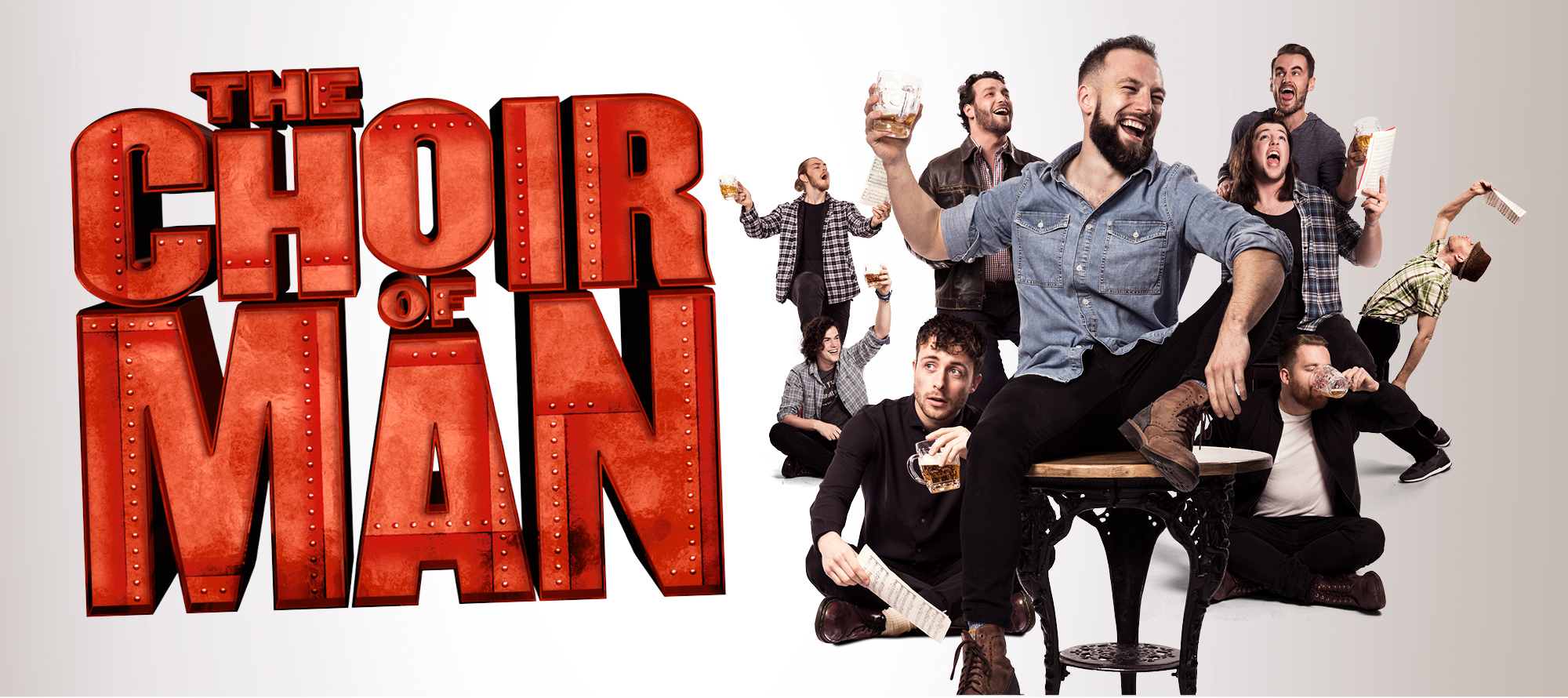
Thank you so much to Connor, Tom and Ben for taking the time to do this interview, and best of luck to Choir of Man on their cruise!
This interview has been edited for length and clarity

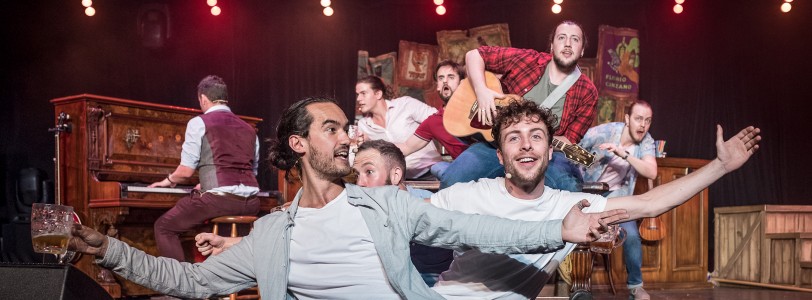
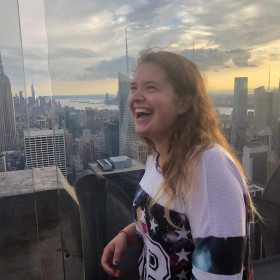
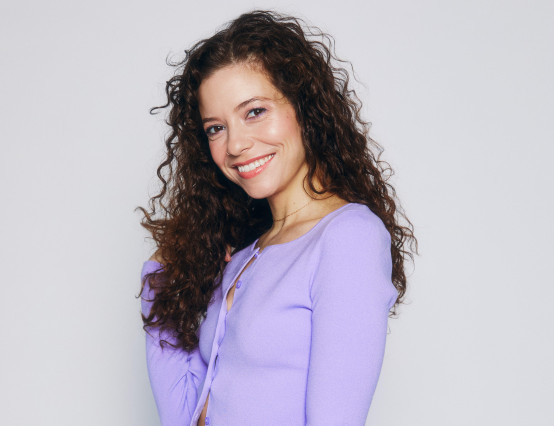
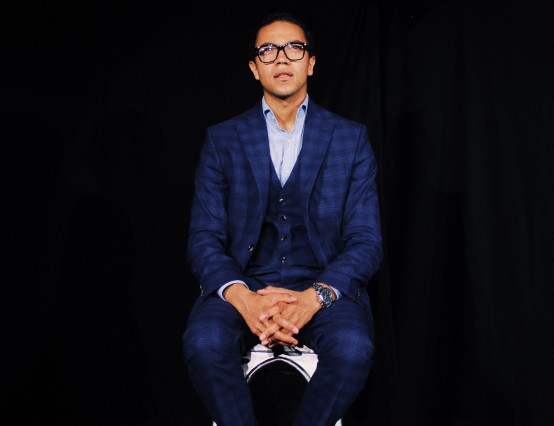
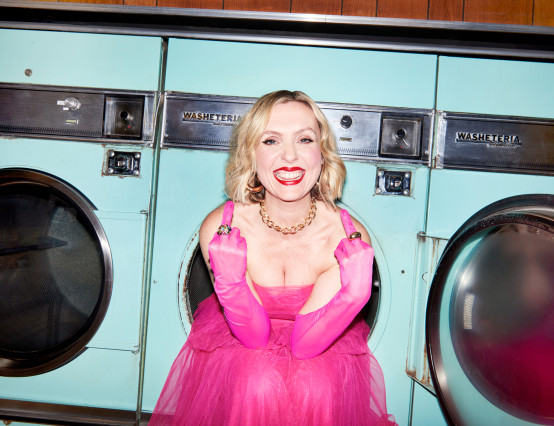



0 Comments